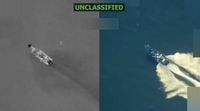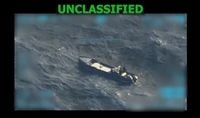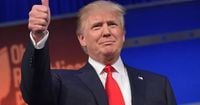On the morning of September 21, 2025, the usually tranquil waters off the Dominican Republic erupted in violence. American warplanes, acting on intelligence about a suspected drug-running operation, attacked a speed boat 80 nautical miles from the Dominican island of Beata. The boat, reportedly carrying 1,000 kilos of cocaine, was destroyed in the strike, killing three people aboard. This event, confirmed by both the Dominican Republic’s National Directorate for Drug Control (DNCD) and a US official at a joint press conference the following day, marks a significant escalation in the United States’ military campaign against drug trafficking in the Caribbean.
This strike is part of a series of recent US military actions in the region. According to the AFP, the United States has now acknowledged three attacks in the Caribbean over the past weeks, resulting in the deaths of more than a dozen alleged drug traffickers. What sets these operations apart is a shift in tactics: instead of seizing vessels and arresting suspects, the US military is now destroying boats outright, raising questions about the legality and proportionality of the response.
President Donald Trump first announced the most recent strike on September 19, sharing a video on his Truth Social platform that showed a speed boat in the cross hairs of a weapon before erupting in flames. While he did not specify the location or mention Venezuela, the attack followed several US strikes on alleged drug boats off the Venezuelan coast. The Dominican DNCD spokesman, Carlos Devers, told reporters that the targeted boat likely originated from Venezuela, a claim echoed by sources close to the ongoing investigation.
The United States’ intensified military presence in the southern Caribbean has not gone unnoticed. The deployment now includes eight warships, a nuclear-powered submarine stationed off the coast of Venezuela, and ten fighter jets relocated to Puerto Rico. Washington insists that the mission is strictly to combat drug trafficking. However, these moves have been widely denounced across Latin America, with many regional leaders expressing concern that the US is preparing for more than just anti-narcotics operations. The presence of such formidable firepower has stoked fears of a potential attack on Venezuela, further inflaming already tense relations between Washington and Caracas.
Venezuelan President Nicolas Maduro has been quick to respond to these developments. Just days after a US strike killed 11 Venezuelans aboard a boat the US claimed was being used to transport drugs, Maduro penned a letter to President Trump. In the letter, dated September 6 and later shared on Telegram by Venezuela’s Vice President Delcy Rodriguez, Maduro flatly denied any involvement in narco-trafficking, dismissing the allegations as “fake news, propagated through various media channels.” The letter, which was confirmed by a US source to CNN, also included an offer to engage in direct talks with Richard Grenell, the US special envoy to Venezuela.
“I respectfully invite you, President, to promote peace through constructive dialogue and mutual understanding throughout the hemisphere,” Maduro wrote. He further claimed that Venezuela is a “territory free of drug production,” promising to send what he described as “compelling data on drug production and drug trafficking” to support his assertion. Maduro’s overture, however, was met with silence from both Grenell and the Venezuelan government’s spokesperson, who declined to comment on the letter’s contents or prospects for negotiation.
President Trump, for his part, has maintained a hard line. On Sunday, when asked by reporters whether he had received Maduro’s letter, he replied, “We’ll see what happens with Venezuela.” The Trump administration has repeatedly accused Maduro of being one of the world’s largest narco-traffickers, alleging that his government works with criminal cartels to flood the United States with fentanyl-laced cocaine. In August, the White House doubled its reward for Maduro’s arrest to a staggering $50 million, further escalating tensions.
The US’s approach has drawn criticism not only from Latin American leaders but also from legal scholars and human rights observers. The decision to destroy vessels and kill suspected traffickers rather than apprehend and prosecute them has sparked debate over the legality of such actions. As AFP notes, drug trafficking is not a capital offense under US law, raising questions about due process and the rules of engagement in these international waters. Despite repeated requests, Washington has yet to provide conclusive proof or intelligence confirming that those killed in the strikes were, in fact, involved in narcotics trafficking.
For its part, Venezuela has responded with a show of force. The Maduro government has launched military exercises, paraded its Russian-built fighter jets, and claimed to have mobilized millions of militiamen in anticipation of possible US aggression. Maduro has consistently argued that the US military buildup is less about stopping drugs and more about regime change, a charge that Washington denies but which resonates with many in the region given the history of US interventions in Latin America.
Amid the saber-rattling, there have been some calls for de-escalation. Richard Grenell, who has previously met with Maduro to negotiate the release of US citizens detained in Venezuela, openly called for a cooling of tensions on September 21. “We can still have a deal to avoid war,” Grenell said, hinting at the possibility of a diplomatic breakthrough if both sides are willing to talk. But with each new strike and every fresh accusation, the path to dialogue appears increasingly fraught.
The broader context is one of deep mistrust and competing narratives. While the US frames its actions as a necessary response to the threat of drug trafficking, Venezuela insists it is being unfairly targeted for political reasons. The lack of transparency from Washington regarding the intelligence behind its strikes only adds to the skepticism. Meanwhile, families of those killed at sea are left with few answers and little recourse, caught in the crossfire of a geopolitical struggle that shows no sign of abating.
As the Caribbean becomes a new flashpoint in US-Venezuelan relations, the world watches to see whether diplomacy or force will prevail. The stakes, both for the fight against international drug trafficking and for the stability of the region, could hardly be higher.



